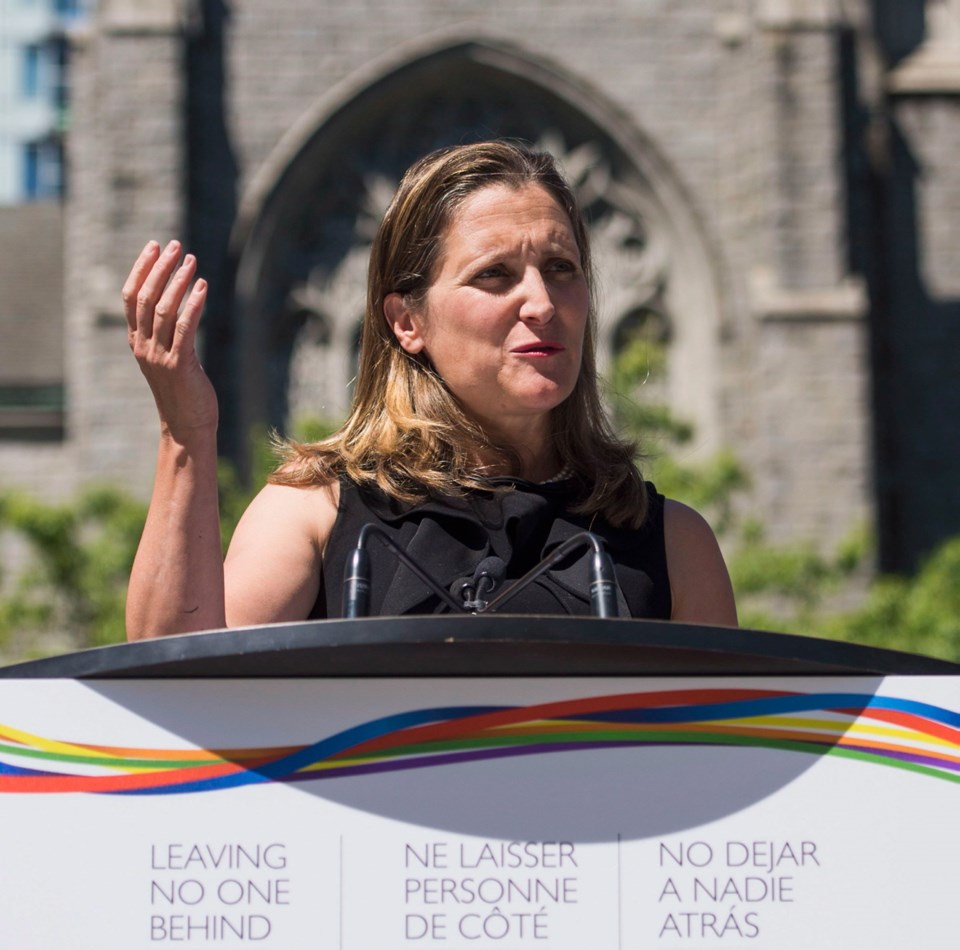The decision by Foreign Affairs Minister Chrystia Freeland to criticize Saudi Arabia has turned into one of the worst diplomatic gaffes in recent times. Freeland and her department issued a series of tweets criticizing the arrest of social activists in that country and demanding their immediate release.
Where to start? If the Saudi regime had any intention of freeing those activists, it’s likely that is now on hold. The government in Riyadh can hardly be seen to cave in to a lecture from abroad.
It’s said that Richard Nixon was about to fire J. Edgar Hoover as director of the FBI when the Washington Post published an editorial calling on him to do just that. Hoover kept his job because Nixon couldn’t let it appear he was being bossed around by the media. Freeland’s untimely intervention might have a similar effect.
But there is a larger issue here. Mohammed bin Salman, Saudi Arabia’s young crown prince, has embarked on a carefully modulated program of modernization.
Women have been granted the right to drive, and can now open a business without the permission of a male relative. Freedom of religion has been proclaimed — this in a staunchly Muslim country where to date churches and synagogues have been banned.
A centre has been set up to examine the authenticity of Islamic texts — potentially an attempt to discredit the more radical interpretations of those texts.
And efforts are beginning to move the economy away from its reliance on fossil fuels toward more sustainable forms of energy.
Critics point out that many of that country’s most repressive policies remain in place. And this is true. The arrest of those activists was one such manifestation.
Yet you have to consider bin Salman’s situation. He became crown prince when his father, King Salman, deposed the incumbent and put bin Salman in his place.
There’s an old saying that if you’re going to attack a powerful enemy, you had better kill him. But the ex-incumbent lives on, no doubt plotting his revenge.
Saudi Arabia is a deeply conservative country. Both the army and the clerics are disturbed (to put it mildly) by any efforts at modernization. They detest the idea that western values are being introduced, however carefully.
If bin Salman needs a reminder of where that can lead, he need only recall what happened to Anwar Sadat. Egypt’s third president was assassinated during a military parade, despite being surrounded by four layers of security and eight bodyguards.
The assassins were officers in the Egyptian army who opposed Sadat’s decision to sign a peace treaty with Israel and move the country forward.
In short, there are distinct limits on how far, and how fast, bin Salman can proceed. His huge over-reaction to Freeland’s tweets might well be a sign of just how fragile his position really is. Maybe he needs a show of force to bank up his support.
Indeed, that seems the only plausible explanation. In the normal scheme of things, you don’t withdraw ambassadors, force your students to leave a foreign country and threaten to freeze that country’s assets because a clueless foreign minister decides to strut her stuff on Twitter.
I understand that many Canadians want our values made public. Though if Freeland was looking for an opportunity to demonstrate those values, other targets come more readily to mind, starting with Iran and North Korea. But diplomacy is about getting results, not striking a pose.
I imagine this will blow over. Neither country can stand this kind of heat for long.
But the prime minister has to take aside his cabinet colleague and remind her what her job is. And it isn’t picking fights with foreign leaders who are walking a tightrope between modernization and a relapse into centuries-old tribalism.



